#analysis era
Text
so ur telling me, aventurine is preservation cuz hes preserving himself. ok. ( visibly shaking )
98 notes
·
View notes
Text
really like how in the bridge of so, i the synth thing sounds like a zoom call ringing
2 notes
·
View notes
Text
the fact that eric kripke isn't even christian really adds something to the way christianity is depicted on supernatural. because its really not about being christian at all, but about living in america, a country dominated by christianity, and having to decide for yourself how to handle that. faith is huge in supernatural, and the mythology of the show is very bible-centric, but notably, christ is never there. even sam, who starts out revering the angels, who once said he prays every night, doesn't actually call himself a christian or imply that he believes in jesus--the show is steeped in christianity and biblical lore and yet neither sam nor dean are christians. in fact, over and over again the church itself is depicted as a haunted house that sam and dean will only ever enter as strangers, as outsiders. priests, preachers, faith healers, chapels, crypts, etc. are all just iconography that create an intense sense of unease that sam and dean respond to instantly. as a jew, its very relatable. an essential part of living in america when you're not christian is that exact sense of unease, of knowing that the culture of your country has ensured that you'll get knocked over by christianity no matter where you go, that you'll see hundreds of people truly believing they're good people while doing awful things in the name of their god, and you have no choice but to confront that. kripke gets it
#i could actually write an essay about this#kripke is jewish and so is sera gamble#and when i rly think about it i think the show is very jewish#in that its a rejection of the christian interpretation of god and free will#its all about questioning what's put in front of you and i think that's a big part being jewish to me#anyway!#rambles#spn#supernatural#spn analysis#spn meta#faith#christianity#theology#kripke era#eric kripke#sam winchester#dean winchester#castiel#zachariah spn#uriel spn#anna milton#american gothic#fav#🔪#containment breach
11K notes
·
View notes
Text
oh dorlene, no one gets you like i do…



my official petition to make the girl, so confusing remix ft lorde the new dorlene anthem 💚
i wanted to make a whole mv but i don’t have the energy lmao
#the power duo#they do the miscommunication trope so we’ll#i could do a whole analysis on why this song is so them but i won’t#stream brat 💚#marauders#marauders era#marauders era girls#dorlene#dorcas meadowes#marlene mckinnon#marlene x dorcas#dorcas x marlene#fanart#wlw#back on my bullshit#gryffindor#slytherin
629 notes
·
View notes
Text
I feel like we don't discuss Nami's relationship with gender enough. Her entire character is so deeply informed by being a girl in a male-dominated pirate world and it's so interesting and so worth talking about.
The background creepiness of Bad pirate crews, which are most of them, how they tend to not have any female crew members at all, how they beckon any pretty young woman around to come play with them and join them. It's real bad. It's also like, a totally 2 dimensional portrayal of evil that is reserved for the most background of background characters.
However I think their ubiquity says a lot about how piracy is meant to be perceived by the public in One Piece, and is one of the strongest indicators of how prevalent misogyny is in-world.
It's very normal in One Piece for regular island inhabitants to have never met a Different class of pirate in their life. There's no reason for them to withhold judgement that maybe these pirates won't be like every crew that attacked before, and to wait and judge them by their actions. I mean frankly that would be irrationally weak self-preservation.
There are people who live peacefully under the flags of Yonkos who protect them, and feel loyalty and gratitude to them for it, but that seems to only be thing with very big name pirates. The East Blue, being the weakest and least populated, has no such plethora of powerful people and resulting turf wars.
So. Nami. Is very clearly implied to have never met any Different pirates before. I'm thinking about what that means. About how every group of pirates she stole from were creepy, dangerous men. How she started going out stealing when she was still a young child. How she didn't have a mother anymore to guide her or comfort her. How Arlong would grab her chin inappropriately, talk about her as a "human female", as property, and god knows what else.
How all the men in Arlong's crew treated her patronizingly, pretending they're all friends, teasing her and playing at respect when really not a single one of them ever stuck up for her or hesitated to accuse her of betrayal. Who were always ready to kill her if she refused to cooperate. Who grabbed her and intimidated her when they felt like it.
That's what she had to come back to after a close call with stealing from other predatory men, instead of the relief of home there was a dark, cramped room filled with endless hours of misery and isolation and blood. Where any one of her captors could barge in and demand new maps, work faster, where did you go, you took too long again this time. Endless threats and incursions.
I'm thinking about that her fight scene in Alabasta, where she tumbles and rips off her cape and uses it to catch her enemy's spikes, before leaping to her feet and running out the back door, all in one moment. How it makes her enemy reconsider her and think, "so the girl's not a total novice at fighting after all." What that implies about her experiences as a young thief. The times she wasn't fast or clever enough and had to fight and claw her way out. Why she always carried a staff and a knife. Why she was the only one before Chopper who had any medical knowledge or experience.
You know she was stitching herself up. And the weapons, how do you think she learned to use those? If any of the Arlong Pirates helped her it wasn't out of kindness and it wasn't gentle.
Then I think about Nojiko, and Bellemere's memory, and the only softness in a hard life. How easily Nami connects to every young woman experiencing hardship that she meets. How completely she dismisses the struggles of men unless they mean something to her and are going through something terrible. The way that Nami only has sympathy for women and children is easily noticeable in-text, but it's also something confirmed in those words by the author. And it's clearly because of the life she lived, the men who had all the power and only abused it, who saw her as nothing but a girl to take advantage of, without anyone aside from her sister clearly knowing and caring about any of it.
Nami clearly isn't bitter, she doesn't think the world owes her recompense, on the contrary she knows she is far from the only person in the world to suffer the things she has suffered. She is endlessly reaching out and kind, but only to those that she isn't sure would get help without her. Certainly, before Luffy, Usopp, and Zoro, no man ever reached out a hand to her without an ulterior motive.
I think when she sees a girl in trouble, a girl biting her lip to hold in a scream of grief, a girl running in the woods away from a monster, a girl captured by pirates, she sees someone who no one is coming for. Who no one will stick up for. A person without allies in a world against her. Whether it's actually true in this case or not, she runs straight for that girl anyways every single time.
#and that is why I will always. ALWAYS. be obsessed with her. writing that last line did make me cry a little. ohhh my godddd. naamiiiiii#my posts#one piece#nami#arlong park arc#east blue saga#op nami#op meta#op analysis#oh my fucking god nami. you forget sometimes because she's so happy and rambunctious and silly now but her life was a#nonstop nightmare horror show for years and years and years#she was all sharp edges and pain and gritted teeth and bloody determination and a hard laugh#for so long. oh my goddddddddddddd oh my goddd nami oh my god nami. oh my god nami.#sexism#implied assault#her life in that era is so fucking dark. you could write so many horror stories in there and they could all feel true
310 notes
·
View notes
Text
"Toshiro Is Sexist," "Toshiro Owns Slaves": What's Really Going on With This Guy?
I've seen a lot of debate on whether or not Toshiro is problematic because he's a slave owner or because he's sexist in the context of his crush on Falin. While I do want to examine his relationship to Falin, I'd like to take a few steps back and unpack his upbringing first. We'll dive into the gender and class dynamics he was raised with and how it impacts his behavior in the main storyline.
Like all people, Toshiro is shaped by the environment he grew up in. Toshitsugu, Toshiro's father and the head of the Nakamoto clan, is the most impactful model of authority and manhood in his life. Toshiro does recognize some of his father's flaws and tries to avoid replicating them. But whether or not he emulates or subverts his father's behavior, Toshitsugu is often the starting point for Toshiro's treatment of others, particularly marginalized people.

The Nakamoto clan exists under a patriarchal hierarchy with Toshitsugu at the top. As noted by @fumifooms in their Nakamoto household post, his wife has more authority than Maizuru. She's able to ban Maizuru from parts of their residence, but despite disliking his infidelity, she can't divorce him or stop him from cheating on her. Their marriage is not an equal partnership.

On an interpersonal level, Toshitsugu and Maizuru also have a fraught relationship. While she does seem to care for him, she's often frustrated by his thoughtless behavior.
For example, he drunkenly buys Izutsumi for her — without considering how she'll have to raise this child — and invades her room in the middle of the night. When he cryptically says, "It's all my fault," she replies, "I can think of a lot of things that are your fault." She calls him an "idiot" and "believes that [Toshiro] will grow up to be a better clan leader than his father," implying that she takes issue with Toshitsugu's leadership.


Because Maizuru and Toshitsugu are described as being "in an intimate relationship" and "seem[ing] to be lovers," Maizuru appears to be a consensual participant. Still, this doesn't negate the large power imbalance between them as a male noble clan leader and his female retainer. This imbalance introduces an insidious undertone to Maizuru's frustration with Toshitsugu. Like Toshiro's mother, Maizuru doesn't have the agency to do as she pleases in their relationship; he has the ultimate authority. For instance, she doesn't seem to want to raise Izutsumi, but she has to anyway.

While Maizuru's role as Toshitsugu's mistress is significant, she's also the Nakamoto clan's teacher and Toshiro's primary maternal figure. She cares deeply for Toshiro: tailing him, feeding him, and taking responsibility even for his actions as an adult. While it might seem sweet that she cares for him like a son at first, Maizuru was notably fifteen years old at the time of his birth. In the extra comic below, he's six years old and has already been in her care for some time. Even if we're being generous and assuming that she didn't start raising him until he was six, she was still only twenty-one at the time she was parenting her boss/lover's child with another woman.

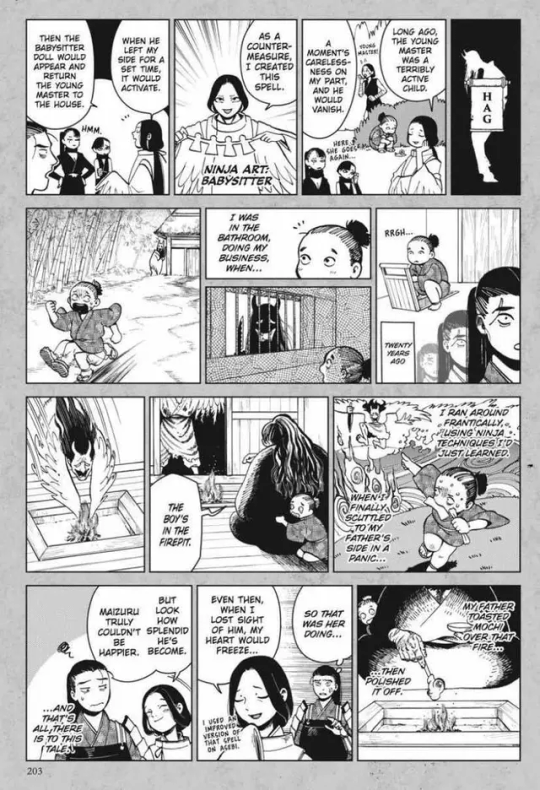
Maizuru's roles as mistress and maternal figure, in addition to her role as retainer, demonstrate the intersection between gendered and class oppression in the Nakamoto household. Despite her original role being a retainer trained in espionage, Toshitsugu presses her into performing gendered labor for him and eventually, Toshiro. She's expected to be Toshitsugu's lover, perform emotional labor for him as his confidant, care for his child, and carry out domestic tasks like cooking. She says, "Even during missions, I was often dragged into the kitchen." If she was a male servant, I doubt she would have been expected to perform these additional tasks. She can't avoid these tasks either, stating that her "own feelings don't factor into it."


Toshitsugu disregards his wife's and Maizuru's desires and emotions to serve his own interests. Because he has societal power over them as a nobleman and in Maizuru's case, her master, neither woman can escape their position in the household hierarchy.
As a result, Toshiro grew up within a structure where men and male nobility, in particular, wield the most societal power. The hierarchical nature of his household and society discourages everyone, including him as a clan leader's eldest son, from questioning and disrupting the existing hierarchy.
The other Nakamoto household members also internalize its sexist, classist power dynamics.
For example, Hien expects that she and Toshiro will replicate the uneven dynamics of the previous generation, regardless of her personal feelings. She sees her and Toshiro's relationship as paralleling Maizuru and Toshitsugu's relationship; she is the closest woman to Toshiro and his retainer, so she's shocked when Toshiro doesn't attempt to begin an intimate relationship with her. Notably, she doesn't have actual feelings for him. Her expectations are centered around the household's precedent of placing emotional, sexual, domestic, and child-rearing labor onto the female servants without any regard for their personal desires.
Hien also probably knows that her position in the household will improve if she is Toshiro's lover because she's seen it improve Maizuru's position. However, the fact that being the future clan leader's lover is the closest proximity she, as a female servant, has to power further reveals the gendered, class-based oppression she and the other women live under.

It's important to note that the Nakamoto clan bought Benichidori, Izutsumi, and Inutade as slaves, so they have less power and agency than Maizuru and Hien. The clan further dehumanizes Izutsumi and Inutade as demi-humans; their enslavement contains an additional layer of racialization.

Toshiro isn't oblivious to the gendered, class, and racial power dynamics of his household. He tries to distance himself from participating in its exploitative power structure. He walls himself off from Hien, who he's known since childhood, to avoid replicating his father's behavior and making his servant into his lover. He disapproves of his father's enslavement of Izutsumi and Inutade, and he lets Izutsumi go when she runs away in the Dungeon.

But does any of this absolve him of his complicity in his household's sexist, classist power dynamics and racialized slavery?
The short answer is absolutely not.
Despite his distaste for his father's exploitation of his servants and slaves, Toshiro still uses them. He refers to his party as "his retainers," and he has them fight and perform domestic tasks for him. You could argue that Toshiro doesn't like to and thus, doesn't regularly use his servants and slaves. In the context of him asking his retainers to help him rescue Falin, Maizuru says, "The only time he ever made any sort of personal request was for this task." But it shouldn't matter whether exploitation is a regular occurrence or not for it to be considered harmful. Toshiro asking Maizuru to cook him a meal still constitutes asking his female servant to perform gendered labor for him. He's also very accustomed to her grooming and dressing him.



Maizuru sees feeding, washing, and even advising Toshiro romantically as fulfilling Toshitsugu's orders to care for his son. They aren't fulfilling a "personal request." But just because her labor has been deemed expected and thereby devalued doesn't mean that it isn't labor or that she isn't performing it.

Maizuru's dynamic with Toshiro is also complicated by her role as his maternal figure. She loves him and wants to take care of him, and she doesn't have a choice in the matter. During Toshiro's childhood, the onus was on Toshitsugu to cease exploiting his lover and release her from servitude, but Toshiro is now an adult man. Seeing as how Maizuru defers to his wishes and calls him "Young Master," they still have a power imbalance that he's passively maintaining. Ideally, he would not ask anything of her until he has the authority to release her from servitude.
Throughout the story, Toshiro acts as if he has no agency and quietly disapproving of his father's actions absolves him of his participation in maintaining oppressive dynamics. While his father still ranks higher than him, he's essentially his father's heir. He has much more power than Maizuru, the highest-ranked servant. At the very least, he could leave his slave-owning household.
Unfortunately, his refusal to confront injustice is consistent with his character's major flaw: he does not express his opinions, desires, or needs. While this character trait obviously hurts his friendships, it also furthers his complicity in the injustices his household runs on.
Toshiro's relationship with eating food — the prevailing metaphor of the series — also parallels his relationship with confronting injustice. Maizuru mentions that he was a sickly child, so the act of eating may have been physically uncomfortable for him. As an adult, his refusal to eat crops up during his rescue attempt of Falin. Denying himself food might have been punishment for not accomplishing important tasks like rescuing Falin and/or a way to maintain control over something in his life when he felt like he'd lost control over the rest of it, again in the context of losing Falin. (Note: I suggest reading this post on Toshiro's disordered eating by @malaierba.)
But he cannot and does not avoid consuming food forever.

Similarly, Toshiro keeps his distance from his retainers and tries not to use them until the Falin situation occurs. His efforts to avoid exploiting his retainers amount to inaction — things he doesn't ask of them or do to them. But his inaction does nothing to dismantle the existing hierarchy that places his retainers under his authority, denies them agency, and often marginalizes them as not only servants or slaves but as women, and he ends up using them as servants and slaves anyways.
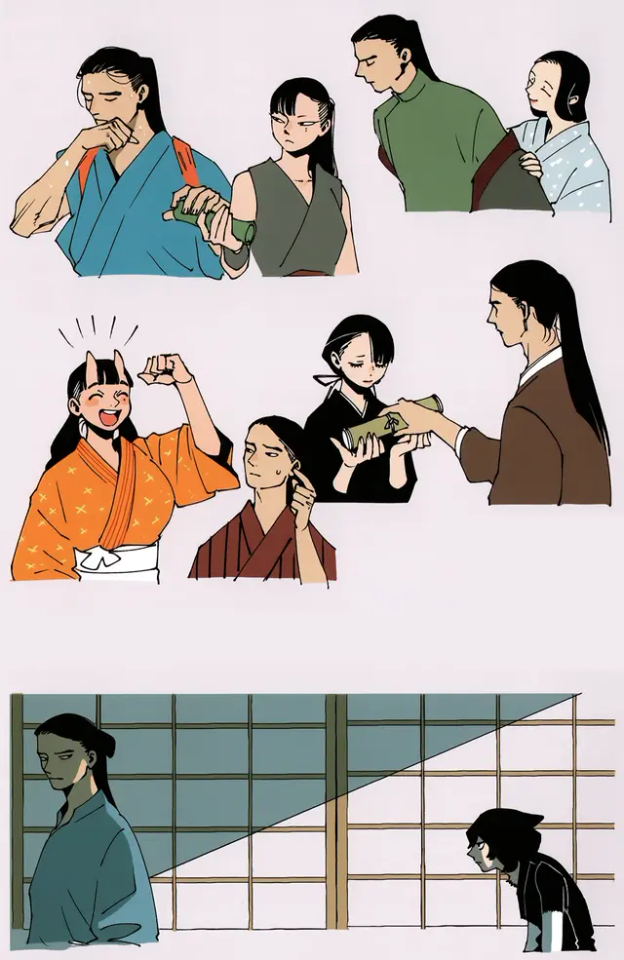
Returning to the narrative's themes of consumption, Toshiro cannot avoid eating just as he cannot avoid perpetuating the exploitative system of his household. The Nakamoto clan consumes the labor and personhood of those lower in the hierarchy. The retainers' labor as spies and domestic servants is the foundation of the clan's existence. Thus, the clan consumes their labor to sustain itself.
Within this hierarchy, the retainers' personhood is also consumed and erased. As Izutsumi describes, they are given different names and stripped of their agency to reject orders or leave. Maizuru and Hien also say their feelings are irrelevant in the context of Toshitsugu's and Toshiro's wants and needs. Both women are expected to comply with whatever is most beneficial and comfortable for the noblemen. Clearly, despite Toshiro's detachment from his household's functions, these social structures remain in place and harm the women under him.

Although we know the Nakamoto clan has male retainers, the choice to highlight the female retainers seems intentional. We're asked to interrogate how not only being a servant or a slave in a noble household impacts a person's life and agency, but how being a woman intersects with being a member of some of the lowest social classes.
Toshiro only distances himself from his father's behaviors of infidelity and exploitation so long as it doesn't take Toshiro out of his comfort zone. He doesn't free his slaves. He's far too comfortable with his female retainers performing domestic labor for him, and he barely acknowledges their efforts; they're shocked when he thanks them for helping him save Falin. He hasn't unpacked his sexist (or classist or racist) biases because he perpetuates his household's oppressive hierarchy throughout the narrative. Considering all of this, he inevitably brings this baggage to his interactions with Falin.

Falin is presumably one of the first women he's had extended contact with that isn't his relative or his family's servant. Because of his trauma surrounding his father and Maizuru sleeping together, he understandably falls for a woman as disconnected as possible from his father and his clan. He seems to genuinely like Falin, respects her boundaries, and graciously accepts her rejection. His behavior towards her is overall kind and unproblematic.
But if Falin had gone with him, she would've likely been devalued and sidelined like the other women of the Nakamoto household. No matter how much he loves Falin, simply loving her cannot replace the difficult work of unlearning his sexism. Love, of course, can and should be accompanied by that work, but by the close of the narrative, we gain little indication that Toshiro acknowledges or seeks to end his part in exploiting and devaluing women and other marginalized people.
A spark of hope does exist. Toshiro expressing his feelings to Laios and Falin suggests that his time away from home has encouraged him to speak up more. Breaking his habit of avoidance may be the first step towards acknowledging his complicity in systems of injustice and moving towards dismantling them.
Special thanks to my very smart friend @atialeague for bringing up Toshitsugu's relationship with Maizuru and the replication of dynamics of consumption and class! <3
#toshiro nakamoto#maizuru#hien#toshitsugu nakamoto#falin touden#izutsumi#inutade#benichidori#shuro#dungeon meshi#dunmeshi meta#dunmeshi analysis#quite literally free my girls#i got so sad after finding that parallel between maizuru and hien both saying their feelings don't matter#reading maizuru's character bio and how she's a brilliant woman#but she's stuck w toshiro's dad like#i'm toshitsugu's number one hater he better watch out#also thinking about how toshiro looked up to maizuru not even his own parents until he found out about maizuru and his dads relationship#that's devastating bro#im entering my clickbait title era LOL i was told my prev titles were too academia pilled and boring sounding#i think i want to write about izutsumi's and inutade's relationships w gender next#delicious in dungeon#dunmeshi#*mine#*meta
358 notes
·
View notes
Text
People try to put down Jily because James was horrid to Sev and yes I agree.. but imagine being Lily.. your best friend betrays you for your oppressors who hate your very existence, your sister too hates you for your very existence and you seem to have no place where you are fully accepted. And then there's this dude who has always been an immature ass.. but who stands by you like a rock against those discriminating assholes.. this guy you've always hated is the one guarding your back as you guard his on the battlefield where you're outnumbered 20 to 1... this guy who could have carried on his shitty bullying habits into the future, but instead chose to fight against the monsters who want to eradicate you when your own best friend left you for them... this guy who loves every bit of you from the magic to the non-magic and to your very bones he worships the hell out of you... he will die for you and he does.
I don't know man, but that level of character development is an understandable reason to marry a dude ❤
#jily#lily evans#james potter#this is not meant to generate hate towards sev so dont even bring that here#im a romantic soulmates jily and platonic soulmates snily believer#meta#character analysis#harry potter#hp#marauders#marauders era#lily evans potter
587 notes
·
View notes
Text
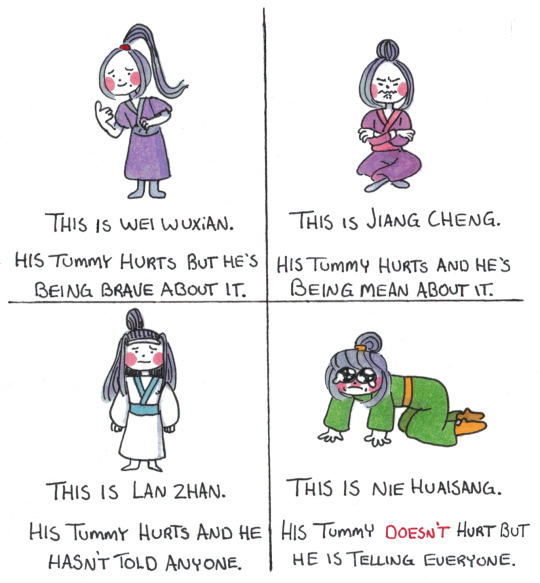
The four alignments of Tummy Hurt
#poorly drawn mdzs#mdzs#wei wuxian#jiang cheng#lan wangji#nie huaisang#bonus comic#Brought to you by: *my* tummy hurts#This is in teen-era for the sole fact that it was imperative that Teen Wangji be granted that caption#I too was a teen with extremely high expectations that gave me stress stomach pain. There's no way lwj's tummy doesn't hurt all the time#NHS says his tummy hurts to 1) get attention 2) get out of situations 3) act as a distraction so the real tummy hurt havers can sneak out#I never would have thought making a tummy hurt alignment chart would be a character analysis but#The underpinning logic here is about how these guys go through the motion of pain. I have a lot of thoughts that would exceed tag limits#I also just want to take the time to say: You don't have to be brave about it. No matter the pain you face.#Your tummy can hurt and you can tell people and be loud about it <3
2K notes
·
View notes
Text
i find it so interesting that Sirius tells Harry that he found out about Regulus' defection after his death, because it doesn't actually make a lot of sense. all the circumstances surrounding Regulus' death are secret--the existence of horcruxes, voldemort's plans, Regulus' plan and decision--to everyone but Kreacher, who we know kept that secret until he told Harry 18 years later. (and if it isn't explicit, it is really likely that Harry was the only one he told, especially because he only did so on Harry's orders. otherwise, Kreacher probably wouldn't have had possession of the locket). Regulus' body is never found so considering the secrecy, it's likely that people only know he's dead from the tapestry of the Black family tree, which would have recorded it automatically with his death.
but. Sirius specifically says that he found out Regulus defected after his death. even though nobody would have known for sure. which begs the question: who told Sirius that and why would they tell him?
the most obvious answer is Kreacher but again, I don't think that makes sense. sure, Sirius could have forced him to tell, but if that was the case, why would Kreacher still have the locket? why wouldn't Sirius take it? and, even more than that, why wouldn't he know the whole story? Sirius believes Regulus' actions came from a place of fear and cowardice, but Kreacher notably calls Regulus brave, which doesn't work with Sirius' version of events, so it's unlikely he got it from Kreacher.
from what i'm thinking, there are two versions of how this goes:
The Rumour Mill: Regulus goes missing and, for one reason or another, everyone believed he defected. maybe it's because the Order didn't know how he died, so it couldn't have been one of their people/in a battle. maybe everyone looked down on him because of his age. maybe he was just a really bad death eater. maybe one of the death eaters falsely claims to have been the one to kill him on voldemort's orders. maybe something else i'm not thinking of. whatever the reason, this theory spreads like wildfire, and despite there being no evidence, Sirius chose to believe it. which says a lot. even after everything the brothers went through, and everything Regulus did, Sirius chose to believe he died a coward rather than a murderer. that he died, maybe not trying to do the right thing, but trying not to do the wrong thing.
Somebody Told Him: Regulus goes missing and no one has any idea what happened to him. not the death eaters, not his family. maybe it's advertised, maybe not. but eventually, someone in the family notices that the tapestry has recorded his death. (this is likely walburga i think--Kreacher probably wouldn't want to draw any attention to himself by claiming to know anything about Regulus' death, since she could order the info out of him, and Orion might have already been dead since he dies the same year as Regulus). so Regulus is now declared dead and someone believes he defected, believes it enough to tell Sirius, disowned and estranged as he is. it couldn't be Andromeda. it wouldn't be Walburga. but it could be Narcissa. Narcissa with her death eater sister, death eater husband, little death eater cousin who goes missing and she tried to work out what happened. she doesn't succeed, we know that, but maybe she gets enough info about Regulus before his death, maybe even from interacting with him and seeing how he was, to believe he defected. and despite Sirius being disowned and estranged, she tells him. maybe from a sense of obligation. maybe because she thinks he deserves to know--she's a sibling too. and he chooses to believe her.
#long analysis sorry. esp because its about canon asdfghj#thinking this thru for a fic and i just love reluctant allies sirius and narcissa when it comes to regulus#regulus black#sirius black#narcissa malfoy#narcissa black#the black brothers#marauders era#the marauders#marauders fandom#marauders#dead gay wizards#brothers in a haunted house#thinking out loud
182 notes
·
View notes
Text
Card Meanings in the new, The Day I Picked Up Dazai art.
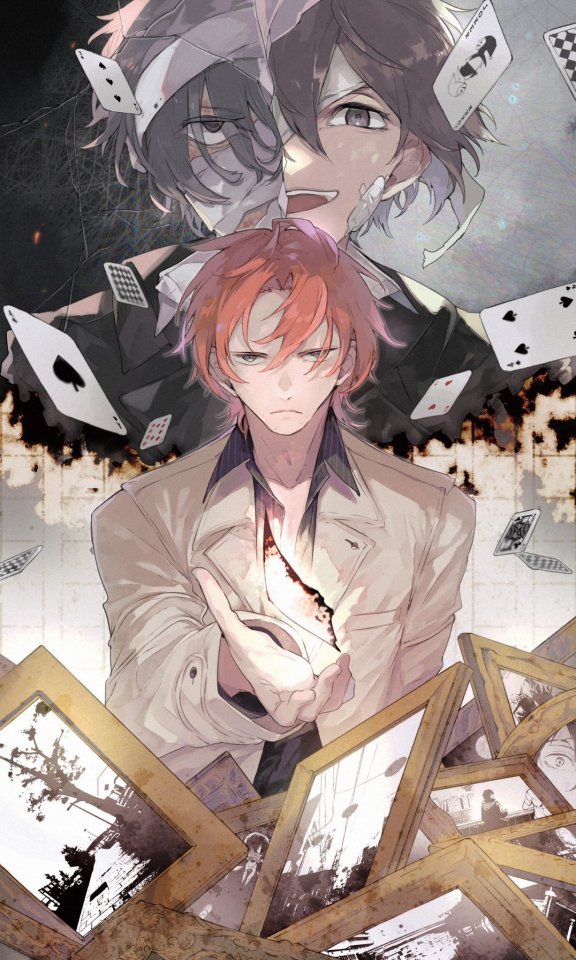
Ok so im currently still in shock that were getting new day I picked up dazai content so bare with me, but onece again Asagiri has included playing cards in his art so of course I have to break down what they mean.
Lets start with side A (the right side):
First we see a joker:

While Gogol is the obvious fit for the joker, the card also describes Dazai extremely well. He is almost always acting like the fool in any given situation, even in the mafia he loved to be as weird and funny as he could as well as tease and annoy the people around him, something jesters famously did.
In fact, his dynamic with Mori is very close to how a king and a jester used to work, where the jester was the only person who was allowed to openly mock the king and would usually heckle him. They also played a key part in psychological warfare, which we see Dazai specialises in.
I think the whole; wit, intelligence and unpredictability kind of speaks for itself.
Next card is the four of spades:

This one is also really fitting, it shows how after the day I picked up Dazai side A, Dazai settles into his little routine of going to bar lupin with Oda as well as how he finally has someone who he can trust and be comfortable around. Finally, it is a clear message of optimism, something Dazai never shows before he meets Oda.
Next the two of hearts:

This one is pretty obvious, it's Dazai and Oda spending time at bar lupin. It actually fits so well, there's not much I can say about it other then how it shows the love and care Dazai and Oda had for each other (platonically)
Now for Side B (prepare to cry)
The first card is the three of spades:

Whyyyyyyyyyy... why Asagiri. This one is also fairly obvious but it has multiple meanings. It most clearly represents Dazai suffering in side B as he has to run the mafia without odasaku and live in utter loneliness while destroying all the connections he never got to have for the sake of a friend he never got to meet.
“It was hard,” muttered the young man. “It was really hard fighting Mimic without you in the organization. I had no choice but to take over for Mori and make enemies of everyone around me to expand the business. Everything I did was for this world’s—”
It also represents the moment on the platform where he nearly tells Odasaku the truth and goes with him to bar lupin, the horrible decision to abandon everything for Odas future
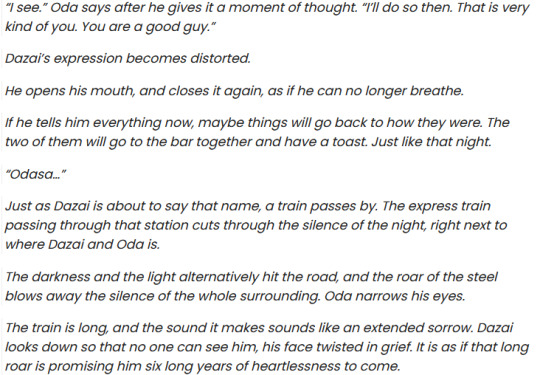
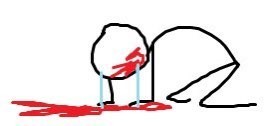
The next card is... the ace of spades:
The ace of spade has many meanings, most of which involve change or transition, but by far its most famous meaning it death. I really don't think I have to explain this one, Beast Dazai having the card of death has a pretty clear meaning.

But the ace of spade does have a secondary meaning, and this one is a little more hopeful, as it shows Dazai passing the safety of this world onto Atsushi and Auktagawa.
Finally, (it's a bit hard to see) we have the ten of diamonds:

I want to focus mostly on the highlighted part because it's what really applies to BEAST Dazai, he lived his whole life to create a world where what matters most to him, that Oda gets to be happy and write his books, becomes real. This card doesn't apply to Dazai directly, more to the fact that he made succeeding in his mission his only priority and discarded everything else.
Bonus round Odasku card; the king of clubs
the only card thats seen on Oda's section and one that clearly represents Odasaku as a character.

"King of clubs represents a dark man, who is loyal and kind. He is a good businessman, shrewd with money and investments, but isn’t selfish. In fact, the King of clubs is a very devoted father, husband and citizen. In a broader sense, the King of clubs encompasses idealized qualities of a fatherly figure. This card is universally considered as a very good omen."
I feel like this sums Odasaku up very well, the devoted father and loyal friend parts are just him to a t.
(this is also the card I think best represents Fukuzawa)
Right, I think I got everything, if you disagree with this or find something I missed, please reblog or comment with whatever you want to add, or send me an ask. I love discussing, and hearing other people's views as long as they're respectful.
If you add something, please add it in the post not the tags, so I can reply to it (or in the tags if that makes you more comfortable)
#bsd#bungou stray dogs#bungo stray dogs#bungou stray dogs dazai#dazai#dazai osamu#bsd analysis#character analysis#bsd character analysis#dazai and odasaku#oda#bsd odasaku#sakunosuke oda#odasaku#the day i picked up dazai side b#the day i picked up dazai#bsd the dark era#the dark era#bungo stray dogs beast#beast dazai#bsd beast#bsd light novel#bsd official art
1K notes
·
View notes
Text

So after the spoilers for Chap 257 dropped, I saw some tweets clarifying the meaning of the Kanji Sukuna used in the chapter when referring to his mother, and the overall reveals in the chapter got me thinking.
I’m making this post as a way of gathering my thoughts, personal speculations and where I think all of this connects to Sukuna’s character and the information Gege has given us over the years. Nothing I say is by any means new information, but like I said, I’m just collecting my thoughts here. By the way, just a warning, this post contains SPOILERS for the JJK Manga! If you don’t like that, please don’t read this!
Something I’ve noticed is that the theme of “Hunger” and symbolism of “Cooking/Food” is heavily referenced with Sukuna throughout the Manga. Gege in a previous Fanbook has disclosed Sukuna’s favorite Hobby to be “Eating”.

This theme is again very much ingrained within Sukuna’s cursed techniques and even his Domain Expansion, the “Malevolent Shrine”. With his two main techniques being “Dismantle” and “Cleave” are cutting-type attacks. He is also able to use a Flame-Arrow, and Fire is essential for making Food. The Shrine in his Domain Expansion literally has mouths on all sides, looking eager to chew down anything in-front of them!
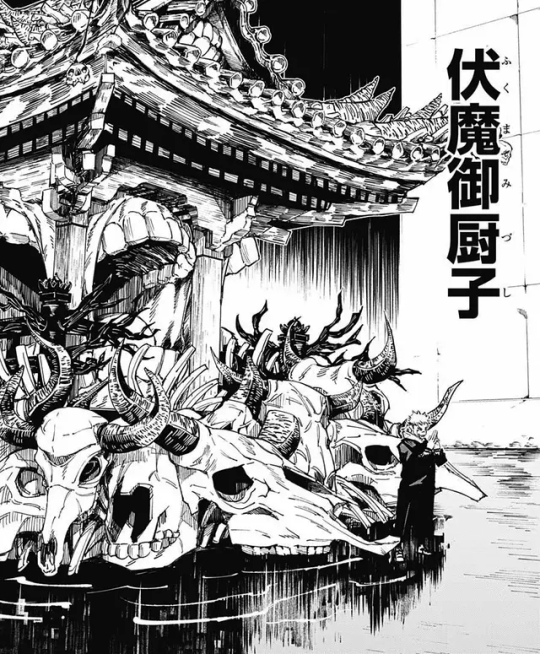
This symbolism also heavily influences Sukuna’s own manner of speech, and the way he speaks to other characters in the series as well. With his post-fight chat with Jogo before his death, Sukuna mentions Jogo lacking the “Hunger” to take control of his desires, preventing him from reaching the heights of Gojo Satoru. Before the Start of their fight in Shinjuku, Sukuna called Gojo a “Nameless Fish on top of his cutting board”, and that he was going to start by “Peeling off the scales”(refering to Gojo’s infinity). There’s also further symbolism that supports this by analyzing the Kanji and meaning of Sukuna’s “Malevolent Shrine” but I’m not very educated on that so I won’t be opening that point here.
What all of this points to is that Eating and Food……is extremely important to Sukuna, to the point that it literally affects him in manners innumerable.
Eating is an instinct, a necessity for the survival of every single living being.
And In the face of extreme Hunger and starvation, even those with the strongest will could lose their Humanity and revert to the basic animalistic side of their existence. (The Heian Period also had a Famine, although I believe the timing to be a bit off, but do with this info as you see fit)
In JJK Chapter 257, it is revealed to us that Sukuna and his Twin were most likely starving in the womb of their starving mother.
On the brink of starvation, Sukuna had to consume his “other self”(his twin), so that he could survive.
Btw, this tweet and this thread gives additional characterisation to Sukuna:

Link to the original thread: Link.
More context (and reactions :P):

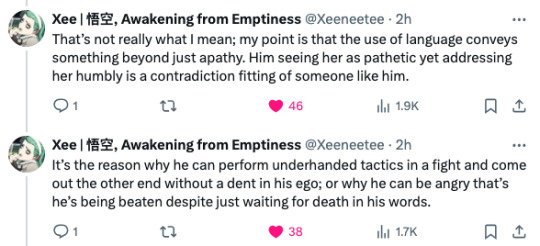
Link to original thread: Here
This reveals to us that indeed, Sukuna was born a twin. And as we all know, “Twins” are seen with extreme scrutiny in Jujutsu Society, they’re not well liked. This too in a period where Cursed Spirits and Jujutsu Sorcery was at its peak, it is not far-fetched to assume that his Mother may not have been treated very well by the people in her surroundings, especially as she bore twins.
When Kashimo asks if Sukuna was born the Strongest or if he made himself the Strongest, this is the response Sukuna gave to him:

When you think about it, how do you think the people around them would have reacted when the woman: who was supposed to birth two twins, gave birth to a single child instead? and that child had consumed his other twin in the womb itself?
No doubt people would’ve been horrified, disgusted and even revulsed. With the woman and her newborn child.
This would’ve led to their further ostracisation in the already very close-minded society. Unable to fend for herself and her newborn child, it must’ve been difficult for Sukuna’s mother to survive. I feel like somewhere along the line, Sukuna was left alone to fend for himself at an extremely young age. To protect himself from both Curses and Society alike.
This is why I believe Sukuna knows what true starvation, weakness and hunger feels like. Both in the emotional and literal sense. He was left without another person caring about him or his well-being, in a cut-throat period where it was “Fight or be killed”.
Powerful curses roamed all across Japan, nowhere was safe. Simply be strong, or you'll die. There's no room for weakness. And initially, a kid!Sukuna was weak, as anyone would be in the beginning when they're just starting out in this world. (and maybe, he didn't have much to eat, leading to long periods of starvation? :') )
I believe it is this debilitating hunger, and feeling of weakness that eventually led to Sukuna’s current Hedonistic mindset.
He’s essentially traumatised by it, and believes that it was his own weakness that led him to experience this sheer starvation. That he deserved to feel this way because he was weak then. Perhaps, the people around him were right, that as long as they have the power and strength to overcome anything, they’re free to do as they please; And there is nothing anyone else could do about it.


I feel like the irony here is that Sukuna himself, must’ve been a “weakling” before eventually rising the ranks to become History’s Strongest Sorcerer. This is also why he values Strength so much.
Ultimately, Sukuna has decided that there was nothing more important than being strong enough to fulfill your own desires. And “eating” is one of his most important desires. It’s his favourite thing to do, the one he derives the most pleasure out of. And like an animal, whose main focus is to consume, consume and consume. He too, simply consumes.
Most morals likely have no meaning to him. He doesn’t care who he hurts, what he does, as long as he’s able to get what he wants. And this isn’t limited to eating.
This is why people referring to Sukuna as a “Natural Disaster” is so befitting of him. Because Natural Disasters also don’t care about what or who they’re destroying, they just come and go, wreaking havoc appropriate for their nature and magnitude.
I believe Sukuna himself has said lines similar in nature, when talking to Kashimo:
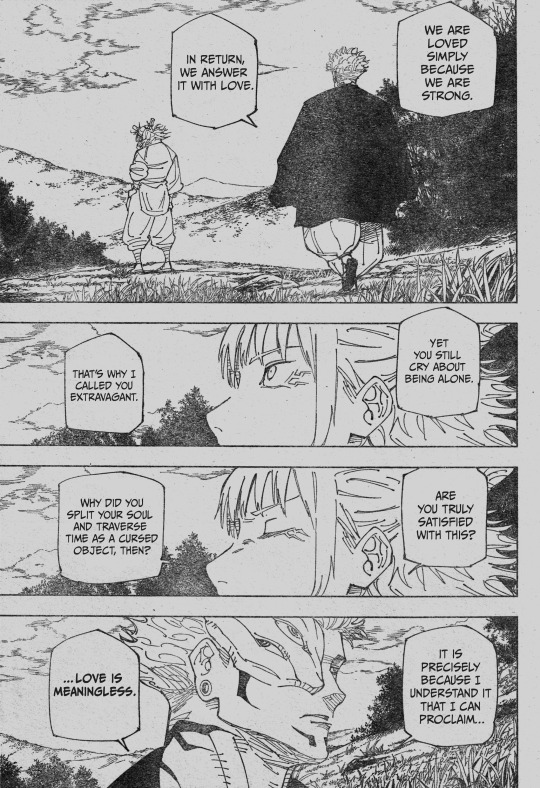
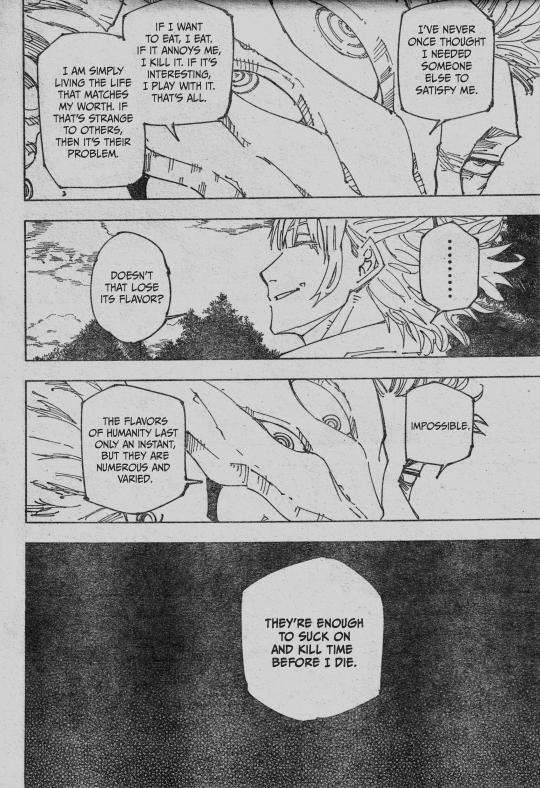
Now I’m not sure how Sukuna perceives or even experiences this “Love”, because I think he has a rather very warped idea of it. I do think that this definition of love is similar to the one that Gojo also understands, but I don’t think he knows what “love” truly is. I’m not sure how I could comment on this, but I do think that Sukuna’s emotionally starved, whether he realises that or not.
Because, like Kashimo himself asked Sukuna “What is the point of dividing your soul into 20 different parts and then traversing across time if you’re satisfied with this?” we do not know the answer to that yet.
But many people have speculated that “Black Box” panels in JJK manga represent a curse (either self-inflicted or put by someone) on the speaker. Like, take a look over here where Sukuna reiterates the same dialogue, except it looks like he’s trying to reassure himself:

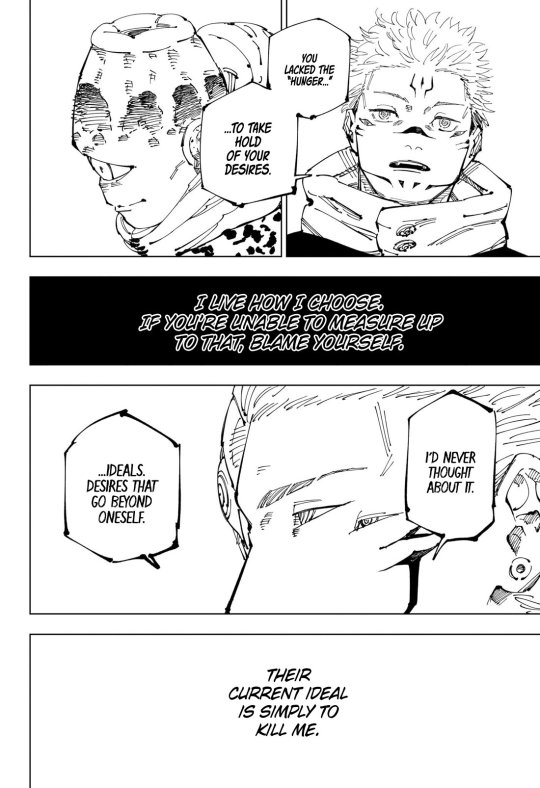
This once again shows that Sukuna has only ever strived for himself, in the same hedonistic fashion, to a very very extreme degree. It is possible that he's been lacking something, and he himself does not realise that he’s lacking it. Maybe it was this subconscious feeling, that led to Sukuna agreeing to Kenjaku’s plan of dividing his soul into 20 different parts, and to traverse across time as a Cursed Object.
Sukuna’s an incredibly complex character, and I’m excited to see where this goes. Gege has put extra care in the way he characterizes and depicts Sukuna, and again, I’m really sad that a lot of that characterization gets lost in translation. Still, I’m going to try my best to understand and get the most accurate feel of his character as I possibly can.
If you made it this far, Thank you for reading! And if you would like, please do leave a comment in the tags or replies because I would love to read what other people think of this and just Sukuna in general. I do not see a lot of people doing critical analysis of him, and a lot of his actions are seemingly swept under the rug. I don’t like that, so hopefully this contributes to people focusing more on Sukuna and his character. (/^v^)/ <3
#ryomen sukuna#jjk sukuna#jjk#jujutsu kaisen#sukuna#king of curses#heian era#character analysis#manga#jjk manga#jjk 257#this is...so very long omg im sorry for my huge word vomit#like 1.4k works but i really did felt like i wanted to gather my scattered thoughts into one place and kind of make the connections#not sure if anyone is gonna read this but if they do#thanks for reading! be sure to let me know what u think!#i just love psycho-analysis of my fav characters and being able to really understand the essence of their characters#their emotions their motivations and to finally be able to do that with Sukuna and reading what everyone else have to say about it ahhh#im super excited! We're finally getting close to the Heian Backlore!! rejoice!!#my gut always did tell me he was a tragic character T_T and now we're finally getting the tid bits#also apologies for adding different panels#but i only added the translations i liked#i don't like J*hn W*rry's translation like yuck#so ima wait for Lightning's translation notes~ for further clarifications!
388 notes
·
View notes
Text
aoughhhh argenti quest...how to be the most capable but cringefail at the same time? Hes the master at them simultaneously.
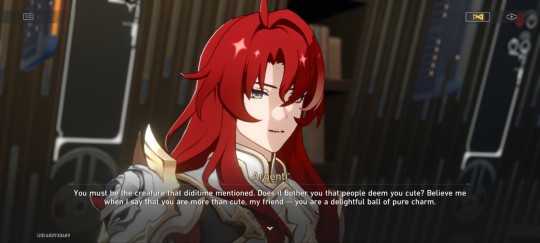
the way he rlly wanted to see wubbaboo 🥺
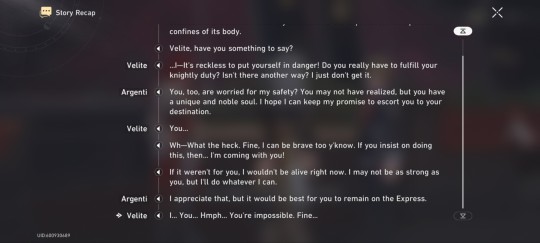
and i find his relationship with velite very...interesting. during the whole quest it felt like smth happened between them (?) Im not sure how to describe it. The thing abt hsr is time is only convenient to the story. Weeks will pass and the reader wont be informed. Exactly how many days were we in the sting or wtv it was? Definitely more than one day. I might have thought otherwise if velite was not part of the quest, but his behavior says more time has passed. He starts with annoyance than near the end feels affection towards Argenti. He talks as if they have gotten a lot closer over the course of the quest, which further soldified my thoughts. How much time passed from the events of the quest and Argenti's mssgs? Obviously quite a bit since Velite changed careers during this time and how Argenti helped.
Overall the quest was pretty cool, but it would've been so much better if they just added a scene like "___ days later..." or smth like that. Or "the next day". The timing kinda threw me off since it didnt take very long but felt as it should have.
But what himeko said at the end kinda made me sad for argenti. He's essentially looking for something that can't be found. Or maybe idrila can idk how aeons work.
#argenti#hsr#honkai star rail#wubbaboo#hhh and not jade#rambling lol#IM SORRY HES JUST SO#AUGHEOSDJSJSNS#this quesr made me feel thinsg#hes just so FAIL#but still wows me#its amazinf#amazinf#amazing#very unique character#yes i am normal about him#of course i am#what makes u think otherwise...#not abnormal abt him in the slightest 😍😍😍#i kinda rlly wanna see velite again ngl#hes cool#the first npc i actually cared for lmao#but he went thru character development!!!#consumerism to slayism 🤩💅🙄#so many thoughts#this better not be the last time we see argenti#i swear to god if the only interaction with him is texts...#analysis era
75 notes
·
View notes
Text
So... I noticed that Qiu wear their jacket slightly differently in step 1, 2, and 3.
In step 1, they leave their jacket open without bothering to button or zip it up.
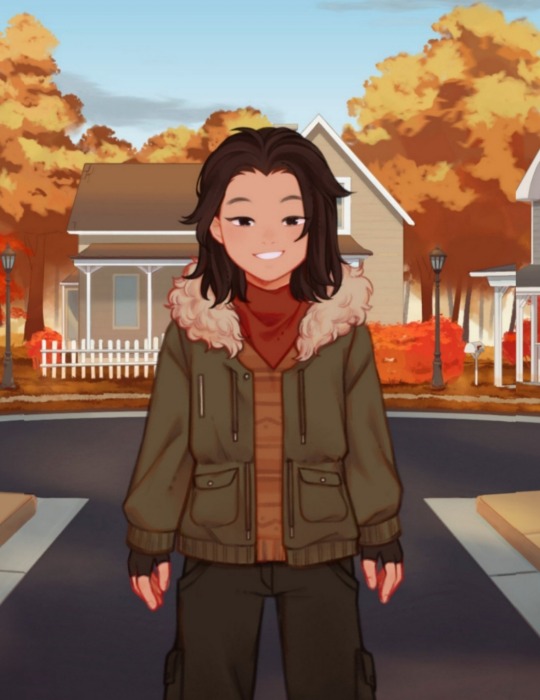
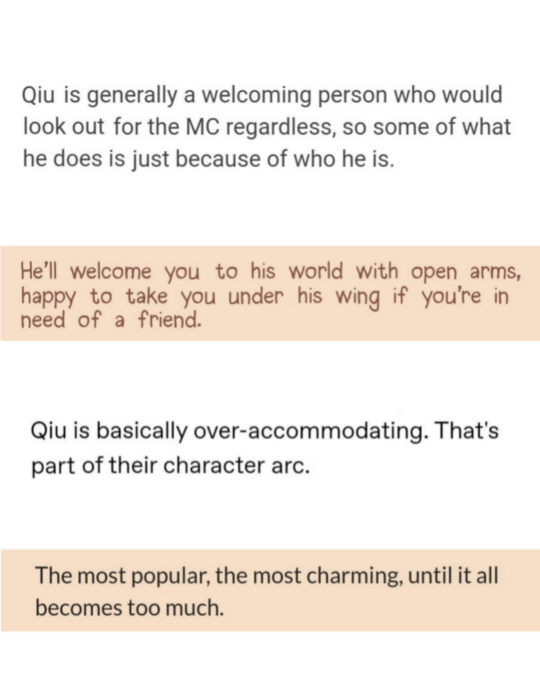
In step 2, they do the exact opposite by wearing their jacket closed and completely buttoned-up.
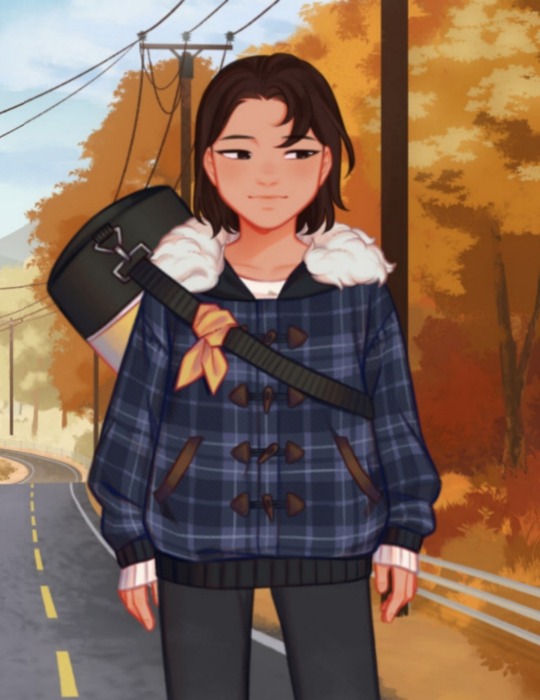
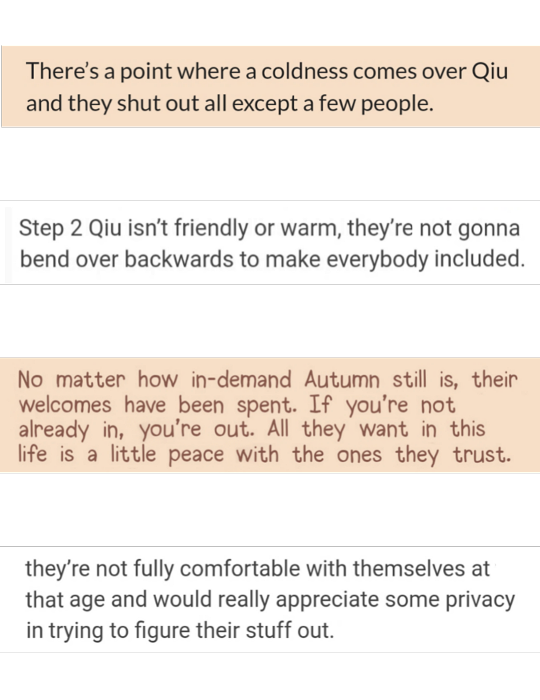
And in step 3, they loosen up their jacket again, but not completely. Ending up with a middle ground where their jacket is partially open and partially closed.
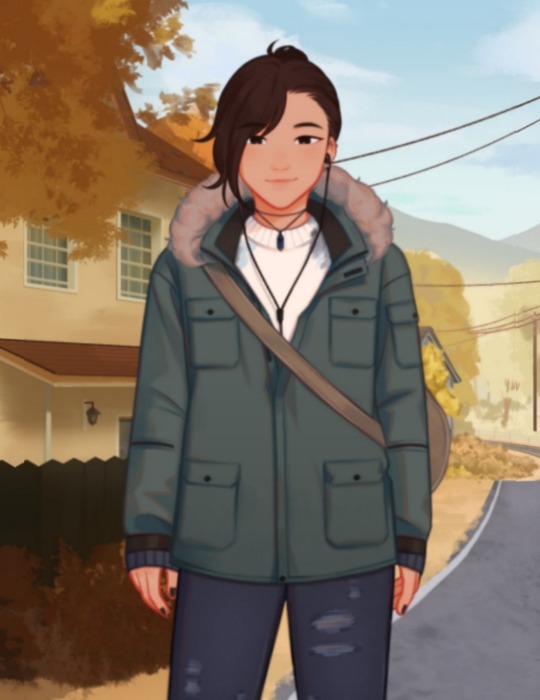
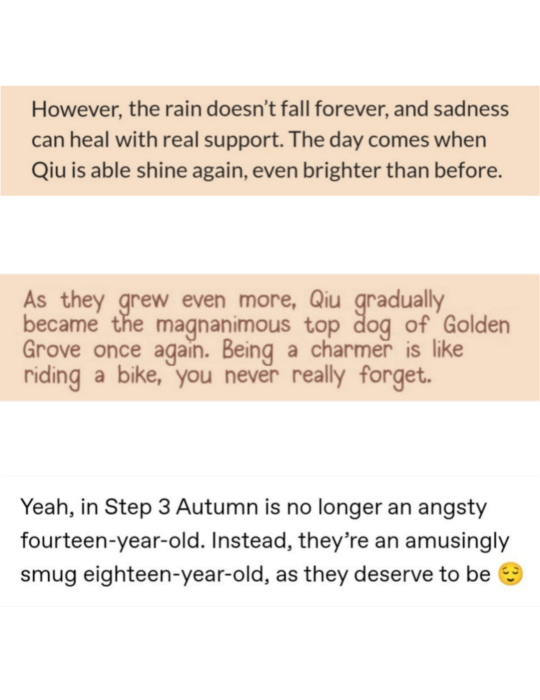
I just think it's interesting that the changes in how they wear their jacket parallel really well with their character arc in every step.
Also the way their outfit went from warm palette (brown green jacket) -> cool shades (blue jacket) -> mix of both (blue-green jacket).
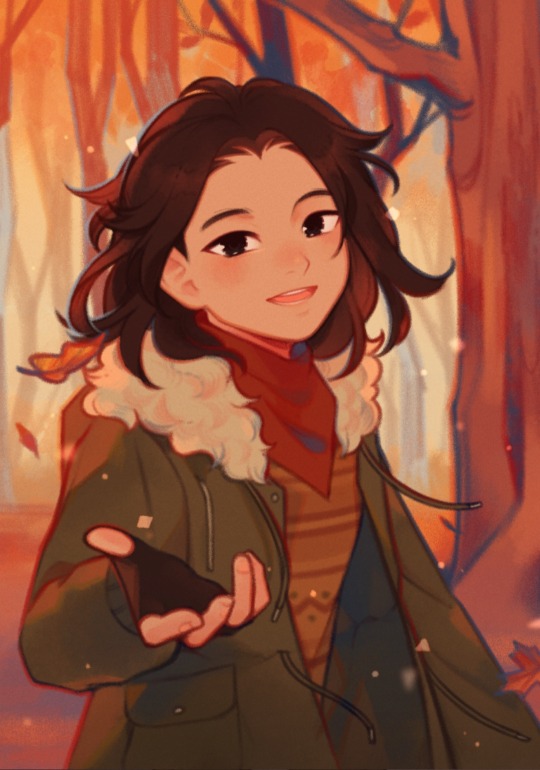
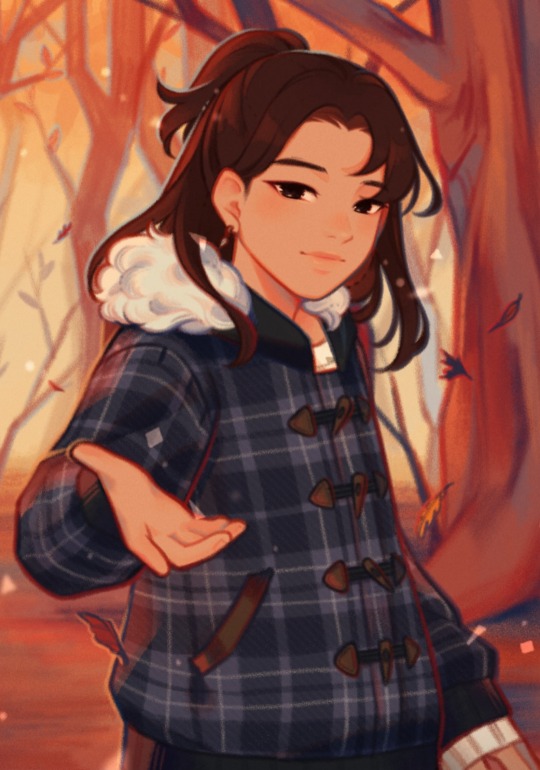
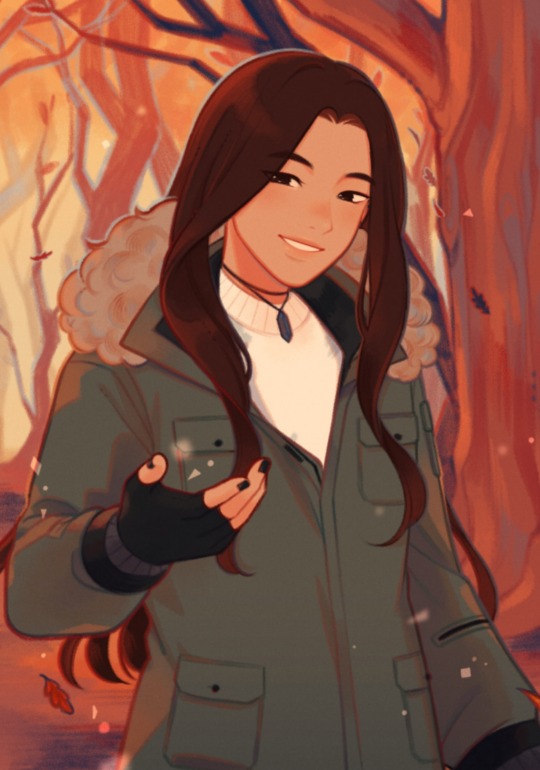
And the way they went from wide grin -> not smiling -> soft smirk.
Yeah.
#I guess I'm in my clothes analysis era#our life#our life now and forever#gb patch#qiu lin#olnf#olnf rambles#qiu rambles
1K notes
·
View notes
Text
characters that put up a front and a performance so constantly that they start to believe the caricature they've created of themself is more authentic than their core and/or elements of that fabrication start to become ingrained in their actual perception of self 🤌
#finding a throughline for characters i think about a normal amount.#bc i'm having a brainrot moment#.d#also back in my mp100 era so im cleaning up an analysis thing i wrote last year and having thoughts#it's not projection it's not i swear (sweating)#anyway some character tags for myself don't bully me#reigen arataka#shigeo kageyama#goro akechi#joshua kiryu#des#.....#pla volo#homura akemi#*
251 notes
·
View notes
Text
We don't talk enough about how when Eddie was arrested, the first person he thought of calling was Buck. He only called Lena because he couldn't legally call Buck. We don't talk enough about what this means.
Eddie didn't want to call anyone else from the 118 because he was worried about their reactions or his job yet he wanted to call Buck who is part of the 118 and works with him because he's secure in the knowledge that Buck would never judge him. That Buck will always come to bail him out of any situation (in this case, literally). He knows that whatever he needs Buck will drop everything to come for him.
Also he wanted to. Eddie wanting anything for himself is a very rare occurrence. Which explains why he was so mad at Buck; because he wanted but he couldn't. Buck did this to him. He carved out a space in his home and in his heart and just when Eddie thinks he can want this and have it, Buck decides to sue the department and takes that option away from him.
"When you decided to sue the department to make cap the bad guy, did you stop for a minute to think what that could do to us?". The 'us' being him and Buck. The 'us' being the trust they've built between them. The 'us' being Eddie wanting Buck's help but Buck not being there.
These little subtle things that we don't talk about much, the things unsaid, those are the things that make Buddie that much more lovable to me.
#911 abc#buddie#eddie diaz#evan buckley#evan buck buckley#scene analysis#buddie meta#buddie analysis#character analysis#lawsuit era#post lawsuit arc
279 notes
·
View notes
Text
Personally, what I love the most about IWTV is the layers of intent behind every detail we see on the screen. The series is extremely visually rich, and I think I lost my mind a little when I saw the Bacon triptych that Armand and Louis are selling in episode 1.

This triptych is Bacon's interpretation of the Mocking of Christ; it depicts three figures at the base of the Crucifixion, jeering. We see it in Dubai - where, notably, three of our main characters are conducting an interview that largely ends up dissecting (and, in a great part, ridiculing and condemning) a conspicuously absent fourth.

The fourth that is, explicitly, often depicted as both a parallel and opposite of Christ.

And here's a fascinating detail about the Bacon triptych: two of the figures are sightless.

Do you see it? Do you see it?..
#interview with the vampire#iwtv meta#iwtv analysis#iwtv season 2#louis de pointe du lac#daniel molloy#the vampire armand#lestat de lioncourt#francis bacon#art history#iwtv#amc iwtv#amc interview with the vampire#and that's setting aside the details of bacon's personal life too#bc. you cannot tell me that armand didn't pick this out in the 70s while in the throes of the DM era
228 notes
·
View notes